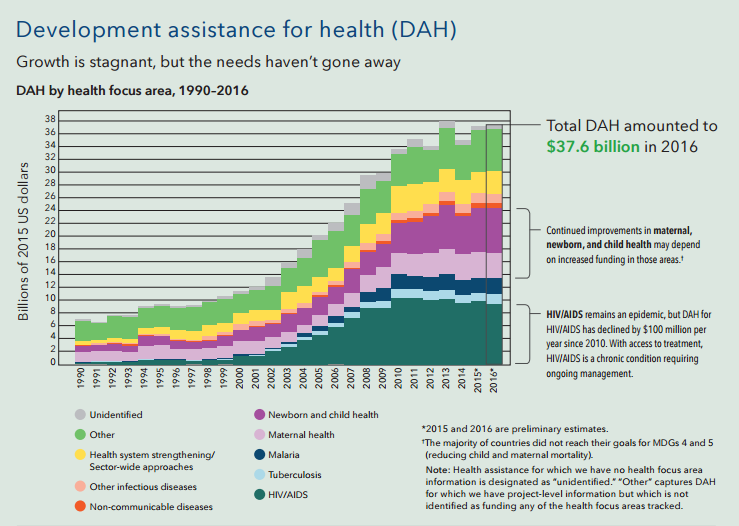With rising threats from non-communicable diseases and emerging infectious diseases, effective global health leadership is vital. In their new book, Governing Global Health: Who Runs the World and Why, Chelsea Clinton and Devi Sridhar use findings on global health spending from the Institute for Health Metrics and Evaluation (IHME) to better understand the different actors in the global health space and look at how well they are helping address the world’s health problems.
On May 10, the London School of Tropical Medicine & Hygiene hosted a book launch for Clinton and Sridhar’s book, which examines current governing strategies in global health. At the event, co-authors Clinton, Vice Chair of the Clinton Foundation, and Devi Sridhar, Professor and Chair in Global Public Health at the University of Edinburgh’s Medical School, spoke of the importance of their findings for global health practitioners and those who study the field.
In the past few decades, global health has seen a booming increase in activity, accompanied by an increase in the number of global health organizations both within the US and across the world. Traditionally, countries have come together to form multilateral organizations, combining their power within the public sector to address shared global health and development concerns. However, recent trends indicate a rise in collaboration between non-governmental organizations, social entrepreneurs, and governments to address the world’s greatest health issues. While these partnerships, formally known as public-private partnerships (PPPs), are founded on the belief that they will be more effective than traditional systems, this book is one of the first to examine the evidence surrounding the impact of PPPs.
With the increase in global health activity over the past 20 years has come an increase in global health spending. Having previously served on IHME’s Financing Global Health Advisory Panel, Sridhar used IHME’s new report Financing Global Health 2016: Development Assistance, Public and Private Health Spending for the Pursuit of Universal Health Coverage to highlight the importance of tracking global health spending sources and channels to understand trends in global health. During the launch, Sridhar displayed a graphic from the report, commenting on the role of global health spending in governing health outcomes, because recent failures in global health have not been about lack of money but rather “where that money is going, to which areas, through which channels, and for what reasons.”

Development assistance for health by health focus area, 1990–2016
Source: Financing Global Health 2016 infographic
In particular, Clinton and Sridhar’s book examines how PPPs might grow in their impact, becoming a useful tool for mitigating the burden of NCDs. Beyond their ability to combat global maladies, PPPs have the potential to address the current gap between development assistance for health and the growing global burden of NCDs. Clinton cited IHME’s work in noting that health areas such as HIV/AIDS and malaria have significantly more dollars invested in them relative to their global burden of disease than do NCDs.
While acknowledging that different agendas may require different systems of governance in global health, Clinton and Sridhar emphasized the importance of tracking spending in guiding decision-making and reducing the global burden of disease. Their new book has brought increased attention to the pressing issues of governance, decision-making, and spending in global health.